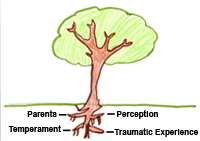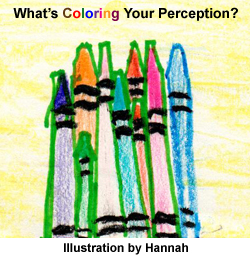 I am continuing our study on Emotions to discover how and when a negative response to life’s circumstances might have taken root in our life. In order to find the root, we must look at our past influences and experiences from birth to adulthood to see how and when the door was opened for a negative emotional response to begin.
I am continuing our study on Emotions to discover how and when a negative response to life’s circumstances might have taken root in our life. In order to find the root, we must look at our past influences and experiences from birth to adulthood to see how and when the door was opened for a negative emotional response to begin.
When I began this series, I listed 4 influences that weigh heavily on our responses to life’s circumstances. Take a look at Hannah’s illustration for a view of those 4 influences.

Last week, we took a stroll back in time to our birth parents. Today, we are going to concentrate on our Temperament. Temperament can best be described as our own UNIQUENESS and is the exception to the parental influence on our lives. Psalm 139:14 says: I am fearfully and wonderfully made.
 What does fearfully and wonderfully made mean? For starters, it means my 2 month old grandbaby, Hope. Don’t even try to tell this grandma that this precious baby is not wonderfully made, as are my other three grandchildren. I know you are thinking the same thing about your children and grandchildren.
What does fearfully and wonderfully made mean? For starters, it means my 2 month old grandbaby, Hope. Don’t even try to tell this grandma that this precious baby is not wonderfully made, as are my other three grandchildren. I know you are thinking the same thing about your children and grandchildren.
But, what about fearfully? What does it mean? The Hebrew word that is translated “fearfully” is yare. In Vine’s Dictionary it means “reverence, to stand in awe, fear.”
When used to exalt a person, it means “standing in awe”. This implies honor, reverence and respect for the person. To be “fearfully” made means to be “awesomely” made.
And that, my friend, is how God created us to be – – AWESOME. We each are born with our own uniqueness that sets us apart as an individual. Two people can look at the same situation and see it completely different. One person may see flowers, the other weeds. One sees barriers the other sees opportunity. Our circumstances, IQ, nationality, economics, environment, and parental influence can mold us, but underneath, we remain the same.
Florence Littauer, author of Personality Plus, classifies temperaments into 4 categories.
Though we are basically classified as one particular temperament, we can have scattered traits in each one. A common emotion is associated with each temperament.
| Temperaments |
Emotional Response |
| Sanquine |
Suppressed Anger |
| Choleric |
Open Aggressive Anger |
| Melancholy |
Depression |
| Phlegmatic |
Guilt |
Each temperament is endowed with many strengths. The gifts that God has placed within us to use in the work He has called us to do flow from us according to our own temperament, our own uniqueness. A complete reading of Psalm 139 reveals just how unique we really are.
Despite the wonderful display of strengths our temperament has, it also has weaknesses, one of which is its emotional response, as you can see from the above chart.
Why weakness, after all, God created us fearfully and wonderfully, didn’t He? Well, we have Adam and Eve to thank for that. Adam’s sin was like an infectious disease—it spread to every human being born thereafter. Because of this, we need to look at our weaknesses, as well as its negative emotional response, and stamp out the infection to keep it from continuing to spread in our life and to those around us.
I can explain temperament best through my own experience, so allow me to bore you with me. It was through the study of temperaments a few years ago that I learned how and when the main root of my emotional response began. Through tests, I discovered that I was predominately Phlegmatic. These are the easy-going, laid back people, want peace at all cost, and are ruled basically with the emotion of guilt.
With that explanation, I’d like to go back to my first memory of emotions. I was six years of age and entering the first grade. Having very protective parents, I was instructed not to play on the swings nor go near them on the playground. Sitting under the trees while everyone else was having fun was tough for a 6-year-old to endure.
One day I could not take it any longer, so I wandered over to the swings. Wouldn’t you know it, one of the high-flying swinger’s foot hit me in the head. The kick in the head did not hurt me nearly as much as the “feeling of guilt” that swept over me for disobeying my parent’s instructions.
The guilt feeling increased over the next few days to the point that I thought I should “confess up” to my deed of disobedience. (Whatever was I thinking!) And that’s when I got the first little sermon of “be sure your sins will find you out.” From that day forward, to me it seemed as though “my sins” found me out with whomever I came into contact. If something went wrong, it must have been my fault, and guilt would crank up and run at full speed.
Phlegmatics do not like conflicts. True to this weakness, I followed this pattern and pushed a lot of things under the rug to keep peace and harmony for years into my adult life. I thought it was virtuous to be so easy going and the “peace keeper.” But what was actually taking place was the old devil was using what I thought was virtuous to make me intimidated to avoid consultation.
What I created in the process was a false harmony, and problems that I encountered went unsolved. Most of the strengths associated with my temperament had lain dormant and unused for many years. As God begin to heal me of false guilt, I realized that sometimes conflict is good. It is needed to right the things that are wrong if we confront them in a Godly manner. But pleasing everyone to avoid conflict and guilty feelings is “safeguarding and preserving one’s own self.”
Often we hear people say, “that’s just the way I am, like it or not.” Would you promise not to get offended with me if I say to you, “just the way you are may need to change?” Change may well begin with knowing the weaknesses of your temperament. When you see how God has uniquely designed your strengths, I promise you that you can’t wait to give the old devil a black eye and move out of those weak areas, including learning how to manage your negative response that most likely started in childhood.
To give further emphasis to a negative response that began in childhood and was changed, I would like to use my own daughter, Crystal, as an example. When I came into the study of temperaments in her early teen years, I gave her the test, and she, too, tested Phlegmatic. True to form, she was a child who liked to please everyone, and yes, felt guilty if she didn’t.
Fast forward a few years — she became the manager of a large fitness center in our area with over 100 employees under her. She quickly realized she could not please everyone if she were to run a large establishment effectively. Remembering the strengths of her temperament from years gone by, she began to put those forth and moved out of the guilt feeling as she confidently and Christ-like dealt with conflicts that arose. A few years later, she opened up her own company.
And that, my friends, is just one of the reasons why we need to have knowledge of our temperaments – to help us in our emotional responses to life.
Your most common emotional response might not be guilt as mine was. Perhaps, it was anger or depression. If you are interested in getting to the root of what might be a major influence on your negative responses today, I recommend reading Personality Plus, by Florence Littauer. It is an excellent book on temperaments.
Join Hannah and me next week as we take a look at another root cause of our negative emotional response: Perception.
Remember: You are fearfully and wonderfully made.
 I am continuing our study on Emotions to discover how and when a negative response to life’s circumstances might have taken root in our life. In order to find the root, we must look at our past influences and experiences from birth to adulthood to see how and when the door was opened for a negative emotional response to begin.
I am continuing our study on Emotions to discover how and when a negative response to life’s circumstances might have taken root in our life. In order to find the root, we must look at our past influences and experiences from birth to adulthood to see how and when the door was opened for a negative emotional response to begin.










 I am continuing our study on Emotions to discover how and when a negative response to life’s circumstances might have taken root in our life. In order to find the root, we must look at our past influences and experiences from birth to adulthood to see how and when the door was opened for a negative emotional response to begin.
I am continuing our study on Emotions to discover how and when a negative response to life’s circumstances might have taken root in our life. In order to find the root, we must look at our past influences and experiences from birth to adulthood to see how and when the door was opened for a negative emotional response to begin. What does fearfully and wonderfully made mean? For starters, it means my 2 month old grandbaby, Hope. Don’t even try to tell this grandma that this precious baby is not wonderfully made, as are my other three grandchildren. I know you are thinking the same thing about your children and grandchildren.
What does fearfully and wonderfully made mean? For starters, it means my 2 month old grandbaby, Hope. Don’t even try to tell this grandma that this precious baby is not wonderfully made, as are my other three grandchildren. I know you are thinking the same thing about your children and grandchildren.